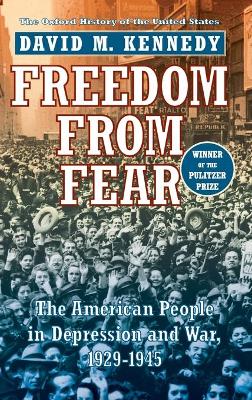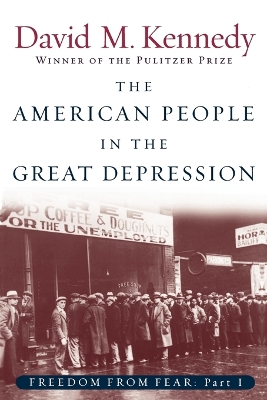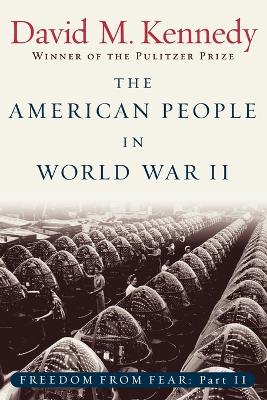Oxford History of the United States
3 total works
Between 1929 and 1945, two great travails were visited upon the American people: the Great Depression and World War II. This text tells the story of how Americans endured, and eventually prevailed, in the face of those unprecedented calamities. The Depression was both a disaster and an opportunity. As the author demonstrates, the economic crisis of the 1930s was far more than a simple reaction to the alleged excesses of the 1920s. For more than a century before 1929, America's unbridled industrial revolution had gyrated through repeated boom and bust cycles, wastefully consuming capital and inflicting untold misery on city and countryside alike. Nor was the fabled prosperity of the 1920s as uniformly shared as legend portrays. Countless Americans, especially if they were farmers, African Americans, or recent immigrants, eked out threadbare lives on the margins of national life. For them, the Depression was but another of the ordeals of fear and insecurity with which they were sadly familiar.
Freedom From Fear: Part 1: The American People in the Great Depression
by David M. Kennedy
Published 11 March 2004
On October 24, 1929, America met the greatest economic devastation it had ever known. In this first instalment of his Pulitzer Prize-winning Freedom from Fear, Kennedy tells how America endured, and eventually prevailed, in the face of that unprecedented calamity.
Kennedy vividly demonstrates that the economic crisis of the 1930s was more than a reaction to the excesses of the 1920s. For more than a century before the Crash, America's unbridled industrial revolution had gyrated through repeated boom and bust cycles, consuming capital and inflicting misery on city and countryside alike. Nor was the alleged prosperity of the 1920s as uniformly shared as legend portrays. Countless Americans eked out threadbare lives on the margins of national life.
Roosevelt's New Deal wrenched opportunity from the trauma of the 1930s and created a lasting legacy of economic and social reform, but it was afflicted with shortcomings and contradictions as well. With an even hand Kennedy details the New Deal's problems and defeats, as well as its achievements. He also sheds fresh light on its incandescent but enigmatic author, Franklin D. Roosevelt.
Marshalling unforgettable narratives that feature prominent leaders as well as lesser-known citizens, The American People in the Great Depression tells the story of a resilient nation finding courage in an unrelenting storm.
Kennedy vividly demonstrates that the economic crisis of the 1930s was more than a reaction to the excesses of the 1920s. For more than a century before the Crash, America's unbridled industrial revolution had gyrated through repeated boom and bust cycles, consuming capital and inflicting misery on city and countryside alike. Nor was the alleged prosperity of the 1920s as uniformly shared as legend portrays. Countless Americans eked out threadbare lives on the margins of national life.
Roosevelt's New Deal wrenched opportunity from the trauma of the 1930s and created a lasting legacy of economic and social reform, but it was afflicted with shortcomings and contradictions as well. With an even hand Kennedy details the New Deal's problems and defeats, as well as its achievements. He also sheds fresh light on its incandescent but enigmatic author, Franklin D. Roosevelt.
Marshalling unforgettable narratives that feature prominent leaders as well as lesser-known citizens, The American People in the Great Depression tells the story of a resilient nation finding courage in an unrelenting storm.
Freedom From Fear: Part 2: The American People in World War II
by David M. Kennedy
Published 11 March 2004
Even as the New Deal was coping with the Depression, a new menace was developing abroad. Exploiting Germany's own economic burdens, Hitler reached out to the disaffected, turning their aimless discontent into loyal support for his Nazi Party. In Asia, Japan harbored imperial ambitions of its own. The same generation of Americans who battled the Depression eventually had to shoulder arms in another conflict that wreaked worldwide destruction, ushered in the nuclear
age, and forever changed their way of life and their country's relationship to the rest of the world.
The American People in World War II—the second installment of Kennedy's Pulitzer Prize-winning Freedom from Fear—explains how the nation agonized over its role in the conflict, how it fought the war, why the United States emerged victorious, and why the consequences of victory were sometimes sweet, sometimes ironic. In a compelling narrative, Kennedy analyzes the determinants of American strategy, the painful choices faced by commanders and statesmen, and the agonies
inflicted on the millions of ordinary Americans who were compelled to swallow their fears and face battle as best they could. The American People in World War II is a gripping narrative and an invaluable analysis of the trials and victories through which modern America was formed.
age, and forever changed their way of life and their country's relationship to the rest of the world.
The American People in World War II—the second installment of Kennedy's Pulitzer Prize-winning Freedom from Fear—explains how the nation agonized over its role in the conflict, how it fought the war, why the United States emerged victorious, and why the consequences of victory were sometimes sweet, sometimes ironic. In a compelling narrative, Kennedy analyzes the determinants of American strategy, the painful choices faced by commanders and statesmen, and the agonies
inflicted on the millions of ordinary Americans who were compelled to swallow their fears and face battle as best they could. The American People in World War II is a gripping narrative and an invaluable analysis of the trials and victories through which modern America was formed.


